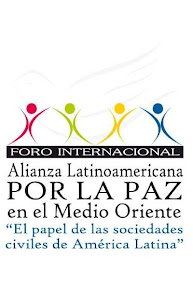Statement by the Cartagena Conference on Building an Arab-Latin American Partnership for Development and Peace
December 2, 2011
NOTE: At the Conference on Building an Arab-Latin American Partnership for Development and Peace held in Cartagena, Colombia, from November 30-December 2, 2011, a distinguished group of leaders from Latin America and the Caribbean and the Arab World met to discuss ways of strengthening relations between the two regions. The Conference was hosted by the Global Foundation for Democracy and Development (FUNGLODE), La Pontificia Universidad Javeriana, and Universidad del Rosario, and welcomed by the Colombian government. At the end of the Conference, they issued the following statement.
Latin America and the Caribbean constitute 34 member states of the United Nations, and the Arab world another 23. Together, they represent approximately one third of the international community. Latin America has a combined population of about 550 million people, and the Arab world another 350 million people. These regions have an extraordinary opportunity to build a powerful partnership for their mutual benefit, and one that will strengthen the international community, multilateral institutions, and global peace and development.
The Arab world and Latin America and the Caribbean are too important to each other not to seek intensified cooperation. Numerous aspects of the relationship between the two regions offer significant opportunities for expanded dialogue and partnership. Latin America and the Arab world need to expand commercial, business and economic development ties; build stronger academic, educational and cultural relations; and examine what they can learn from each other about good governance, institution building, and peace and reconciliation. Latin Americans of Arab heritage constitute an important base to build this vital partnership, reconnecting them with their heritage and connecting the Arab world with their countries in this hemisphere.
In terms of business, trade, commercial and economic ties, Latin America and the Caribbean and the Arab world have complementary rather than competing interests. They are potentially important markets for each other’s exports. The Arab world is experiencing rapid population and economic growth, and is a major potential market for food, water management and agricultural exports from Latin America. Latin America and the Caribbean can serve as an important market for Middle Eastern energy and other exports, and a significant target for capital investment.
However, at present, trade between the regions constitutes about one percent for each region respectively. Major opportunities exist for public and private investments in each other’s economies. Joint ventures, public-private partnerships, mutual investment strategies and other ways of strengthening economic ties between Latin America and the Arab world must be developed as a crucial basis for strengthening ties and cooperation.
As another essential component of a new partnership, Latin America and the Arab world need to build stronger academic, educational and cultural relations. There is an urgent need to study each other’s identities, cultures, and above all, languages in order to facilitate communication and strengthen understanding. Translation of literature and scholarly work between the two cultures is minimal and needs urgent attention. Educational programs to increase awareness of the history, geography, achievements and challenges of the two regions will be indispensable. Scholarly and academic exchanges at present levels are insufficient and need to be quickly strengthened in order to serve as the fundamental basis for stronger cross-cultural communication.
In the field of education and culture, Latin America and the Arab world can both draw on a large percentage of youth and young adults. Both of these rapidly developing regions are characterized by the unique dynamism that is associated with the young. A more vibrant, developing relationship between Latin America and the Arab world should mobilize this energy and connect these youths among themselves, developing the networks that will create an ever deepening and expanding partnership between the regions into the future. Student exchange, especially on a long-term basis, is an ideal vehicle to begin building these networks.
On issues regarding good governance, institution building, and peace and reconciliation, the Arab world and Latin America should have a particularly fruitful and mutually enlightening dialogue. The Arab World is currently undergoing a tremendous period of transformation, which is taking many different forms in different Arab societies. Over several recent decades, many Latin American states also experienced profound transformations, and today virtually every society in Latin America is more prosperous, vibrant, open, tolerant and peaceful than they were several decades ago. Therefore, Latin American and Arab societies, with their very different but mutually relevant experiences, have much to learn from each other, particularly during this period of dynamic change in the Arab world and continued progress in Latin America.
Furthermore, Latin America has an important role to play internationally in helping to resolve globally destabilizing challenges such as the Arab-Israeli conflict. In recent decades, parts of Latin America, particularly Central America, resolved significant civil and international conflict through dialogue and negotiations, often guided by regional leaders and peacemakers as well as the broader international community. Latin America has made an important contribution in recent years towards resolving the Arab-Israeli conflict by most of its states recognizing an independent state of Palestine alongside Israel and strengthening the international consensus for a two-state solution based on UN resolutions. In the same spirit, the Cartagena Conference welcomed Palestine’s admission as a member of UNESCO and affirmed that bilateral and multilateral recognition of Palestine is an important contribution to ending the conflict.
Building a stronger Arab-Latin American partnership is not optional in the highly competitive global environment; it is an imperative. Therefore the Conference announced the establishment of a Council for Arab Relations with Latin America and the Caribbean that will be the driving force in building an intensified and expanded Arab-Latin American partnership.








